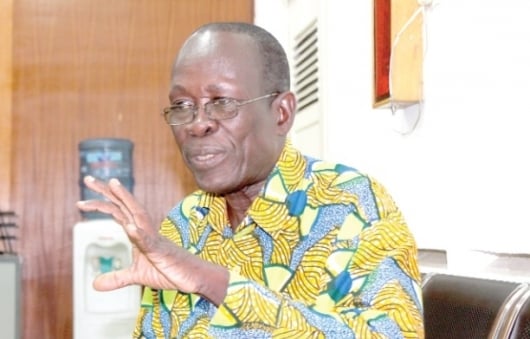The Ghana Federation of Labour (GFL) has urged the National Democratic Congress (NDC) government to prioritize the retrieval of allegedly misappropriated funds from the previous New Patriotic Party (NPP) administration, specifically focusing on the Accra Sky Train scandal. The GFL argues that recovering the $2 million allegedly lost in the failed project would be more beneficial to the nation than simply imprisoning those involved. They contend that the focus should be on recouping the financial losses to the state, rather than merely pursuing punitive measures while the families of the accused potentially benefit from the ill-gotten gains. This call for prioritizing asset recovery over incarceration underscores a pragmatic approach to addressing corruption, emphasizing the tangible benefits of returning lost funds to the public coffers.
The Accra Sky Train scandal revolves around a $2 million payment made to Africa Investor Holdings Limited for preliminary work on a transportation project that never came to fruition. Former GIIF CEO Solomon Asamoah and former board chairman Prof. Christopher Ameyaw-Akumfi are facing charges related to this alleged misappropriation, including wilfully causing financial loss to the state, conspiracy to commit a crime, and violation of the Public Property Protection Decree. Mr. Asamoah denies evading justice, claiming his presence in Senegal is for scheduled board meetings, while Prof. Ameyaw-Akumfi has been questioned and released on bail. This case highlights the complex legal proceedings involved in addressing alleged financial misconduct, involving investigations, charges, and the potential for lengthy court battles.
The GFL’s call for prioritizing asset recovery reflects a growing sentiment within the public discourse on corruption. They advocate for a “progressive” approach to punishing those involved in corrupt acts during the previous administration, suggesting a broader focus on financial restitution. This stance underscores a shift in emphasis from purely punitive measures to strategies that aim to directly benefit the nation by replenishing lost funds. The GFL maintains that retrieving the misappropriated funds would have a more significant impact on national development than simply incarcerating the individuals involved.
The Attorney General’s Office has affirmed the seriousness of the allegations, stating that the accused acted outside their mandate, causing substantial financial loss to the state. The $2 million payment, made in February 2019, was allegedly executed without proper board approval, violating GIIF’s governance procedures. The charges, filed at the High Court, include wilfully causing financial loss, conspiracy to dissipate public funds, and breaches of the Public Property Protection Decree. This legal action signifies the government’s commitment to pursuing accountability for alleged financial misconduct and ensuring adherence to established governance processes.
The Accra Sky Train project, initiated in 2018 as a public-private partnership, ultimately failed to progress beyond the initial planning stages. The Attorney General has characterized the case as serious financial misconduct, highlighting the unauthorized nature of the payment and the lack of project delivery. The High Court is expected to proceed with hearings, with GIIF board members anticipated to testify as prosecution witnesses. This case forms part of a broader anti-corruption drive under the Mahama administration, which also includes investigations into other alleged instances of financial impropriety, such as the National Service Scheme ghost names scandal.
The GFL’s perspective on prioritizing asset recovery over incarceration represents a practical approach to addressing corruption. By focusing on recouping lost funds, the government can directly contribute to national development and demonstrate a tangible commitment to combating financial misconduct. This approach complements the ongoing legal proceedings aimed at holding individuals accountable for their actions. The














